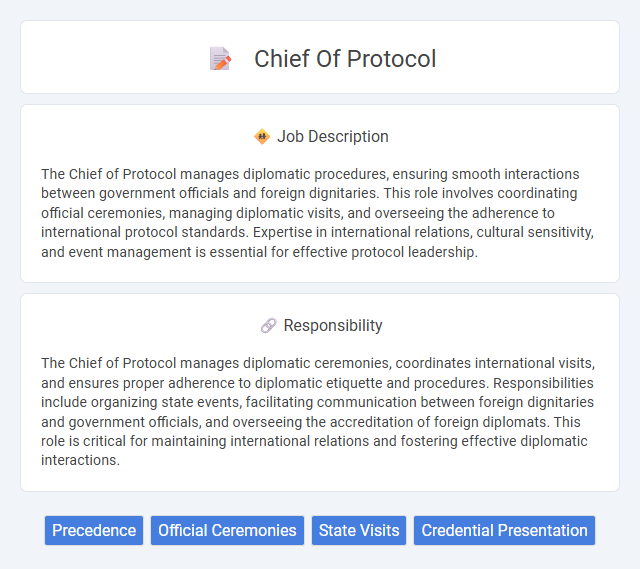
The Chief of Protocol manages diplomatic procedures, ensuring smooth interactions between government officials and foreign dignitaries. This role involves coordinating official ceremonies, managing diplomatic visits, and overseeing the adherence to international protocol standards. Expertise in international relations, cultural sensitivity, and event management is essential for effective protocol leadership.
Candidates with strong interpersonal skills and cultural sensitivity are likely to be suitable for the Chief of Protocol role, as the position demands managing diplomatic relations and organizing formal events. Individuals who exhibit high levels of organization, attention to detail, and the ability to remain calm under pressure may excel in this job. Those lacking in tact or struggling with communication in diverse settings might find the responsibilities challenging and less fitting.
Qualification
A Chief of Protocol must possess extensive experience in international relations, diplomatic etiquette, and event coordination to ensure seamless management of official ceremonies and state visits. Strong communication skills, cultural sensitivity, and the ability to navigate complex political environments are essential for fostering positive diplomatic relationships. A background in political science, international affairs, or a related field, often complemented by advanced degrees or specialized training in protocol, enhances a candidate's qualifications.
Responsibility
The Chief of Protocol manages diplomatic ceremonies, coordinates international visits, and ensures proper adherence to diplomatic etiquette and procedures. Responsibilities include organizing state events, facilitating communication between foreign dignitaries and government officials, and overseeing the accreditation of foreign diplomats. This role is critical for maintaining international relations and fostering effective diplomatic interactions.
Benefit
The Chief of Protocol likely enhances diplomatic relations by ensuring smooth interactions between government officials and foreign dignitaries. This role probably improves a nation's international image through meticulous planning of official ceremonies and events. The position may also increase efficiency in diplomatic communications, reducing misunderstandings and fostering cooperation.
Challenge
The Chief of Protocol likely faces the challenge of managing complex diplomatic interactions that require careful cultural awareness and impeccable etiquette. There is a high probability that they must navigate sensitive political situations while ensuring seamless coordination of official events and visits. Maintaining strict confidentiality and adaptability under pressure may also be significant obstacles in this role.
Career Advancement
A Chief of Protocol advances their career by building expertise in international diplomacy, event management, and government relations, often gaining experience through roles in foreign service or administration. Networking with high-ranking officials and mastering cross-cultural communication enhance prospects for promotion to senior diplomatic or governmental positions. Continuous professional development in protocol standards and negotiation skills also accelerates career growth in this specialized field.
Key Terms
Precedence
The Chief of Protocol manages the official order of precedence, ensuring proper rank and protocol during state ceremonies, diplomatic events, and official visits. This role involves organizing seating arrangements, introductions, and ceremonial customs in accordance with international standards and government regulations. Maintaining precedence order preserves diplomatic etiquette, fosters respect among dignitaries, and upholds national and international relations.
Official Ceremonies
The Chief of Protocol oversees the planning and execution of official ceremonies, ensuring adherence to diplomatic protocols and cultural sensitivities. This role manages state visits, formal receptions, and international delegations with precision to enhance a nation's diplomatic image. Expert coordination by the Chief of Protocol guarantees seamless ceremonial events that foster respectful government and foreign relations.
State Visits
The Chief of Protocol orchestrates state visits by coordinating diplomatic protocols, ensuring adherence to international customs and formalities. Responsibilities include organizing official ceremonies, managing guest itineraries, and facilitating communication between host governments and visiting dignitaries. Expertise in protocol regulations and cultural sensitivities is essential for the seamless execution of high-level diplomatic engagements.
Credential Presentation
The Chief of Protocol manages official diplomatic interactions, ensuring seamless coordination during credential presentations between foreign ambassadors and the host country's head of state. This role involves meticulous planning of ceremonial protocols, adherence to international diplomatic standards, and facilitating effective communication to uphold the nation's diplomatic decorum. Credential presentations symbolize the formal recognition of diplomatic representatives, reinforcing bilateral relations and mutual respect among sovereign states.
 kuljobs.com
kuljobs.com